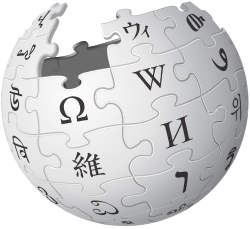
The following outline is provided as an overview of and a topical guide to Wikipedia:
Contents
- Descriptions of Wikipedia
- Implementation of Wikipedia
- Wikipedia community
- Viewing Wikipedia off-line
- Diffusion of Wikipedia
- Websites that use Wikipedia
- Wikipedia-related media
- Third-party software related to Wikipedia
- General Wikipedia concepts
- Politics of Wikipedia
- History of Wikipedia
- Wikipedia-inspired projects
- Wikipedia in culture
- People in relation to Wikipedia
- Critics of Wikipedia
- Wikipedia Foundations and Organizations
- Wikipedia's sister projects
- Wikipedias by language
- See also
- Explanatory notes
- References
- External links
Wikipedia [a] is a free online encyclopedia written and maintained by a community of volunteers, known as Wikipedians, through open collaboration and the wiki software MediaWiki. Founded by Jimmy Wales and Larry Sanger in 2001, Wikipedia has been hosted since 2003 by the Wikimedia Foundation, an American nonprofit organization funded mainly by donations from readers. [1] Wikipedia is the largest and most-read reference work in history. [2] [3]
Initially available only in English, Wikipedia exists in over 340 languages and is the world's ninth most visited website. The English Wikipedia, with over 7 million articles, remains the largest of the editions, which together comprise more than 65 million articles and attract more than 1.5 billion unique device visits and 13 million edits per month (about 5 edits per second on average) as of April 2024 [update] . [4] As of September 2025 [update] , over 25% of Wikipedia's traffic comes from the United States, while Japan accounts for nearly 7%, and the United Kingdom, Germany and Russia each represent around 5%. [5]
